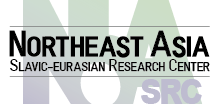UBRJ Seminar "Transboundary Disasters: What Should Be Done To Restore the Aral Sea Region?
Dark tourism, illegal fishing and livestock farming represent just some of the many examples of how local people have strived to make a living in the Aral Sea Region - a location notorious for environmental catastrophe. This was one of the main messages from Chida Tetsuro's UBRJ Seminar.
Appointed as Associate Professor at Nagoya University of Foreign Studies from April 2017, Professor Chida's seminar was attended by over 20 people. Introducing his latest research under the heading "Transboundary Disasters", he explained how shoots of economic life were returning to the Aral Sea Region. Although a historian by training, Professor Chida combined analysis from geography and border studies to clarify how the settlement of different ethnic groups overlaps and causes various opportunities and challenges to economic development in the region.
Of particular interest were Professor Chida's insights into the resilience of local people; how the wrecks of boats were enabling 'dark tourism', how the return of water was supporting illegal fishing, and how the availability of land around the water was sustaining livestock farming. His presentation also suggested future possibilities for research. For example, while dark tourism is viable for people from Uzbekistan, its feasibility for those from Kazakhstan remains unproven. Also, a nagging doubt is the extent to which livestock farming can be relied on to revive the region's economy. Although these questions remain, Professor Chida with his concept of "Transboundary Disasters" has made an excellent start in finding ways to answer them.

 Eurasia Unit for Border Research (Japan)
Eurasia Unit for Border Research (Japan)




